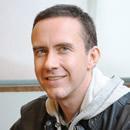Peter Bell
Evangelist/hacker for hackNY
Peter is an evangelist and hacker for hackNY - a not-for-profit that aims to federate the next generation of hackers for the New York innovation community.Peter is a regular presenter at national and international conferences on ruby, nodejs, NoSQL (especially MongoDB and neo4j), cloud computing, software craftsmanship, java, groovy, javascript, and requirements and estimating. He is on the program committee for Code Generation in Cambridge, England and the Domain Specific Modeling workshop at SPLASH (was ooPSLA) and reviews and shepherds proposals for the BCS SPA conference.
He has presented at a range of conferences including DLD conference, ooPSLA, RubyNation, SpringOne2GX, Code Generation, Practical Product Lines, the British Computer Society Software Practices Advancement conference, DevNexus, cf.Objective(), CF United, Scotch on the Rocks, WebDU, WebManiacs, UberConf, the Rich Web Experience and the No Fluff Just Stuff Enterprise Java tour.
He has been published in IEEE Software, Dr. Dobbs, IBM developerWorks, Information Week, Methods & Tools, Mashed Code, NFJS the Magazine and GroovyMag. He's currently writing a book on managing software development for Pearson.
He is an organizer of the CTO School http://www.ctoschool.org - an organization in NYC devoted to creating the next generation of technical leaders. He also organizes the node.js meetup in New York and co-organizes the Domain Driven Design and Grails meetups.
He is a regular instructor at General Assembly in New York. His presentations cover managing software development, NoSQL, mobile development, Javascript development, Twitter Bootstrap and Javascript frameworks.
He tweets regularly as @peterbell.
Presentations
Professional Javascript development for the Java developer
8:30 AM MDT
Like it or not, with application servers like node.js and increasingly rich client MVC frameworks like backbone.js, Javascript is in your future.
In this session we'll look deeply at the fundamental strengths and weaknesses of the language and how to become a javascript professional. We'll include information on using Jasmine for testing your Javascript.
The Lean Startup - for Enterprise Software Developers
10:30 AM MDT
Intuit and even the US government want to be “lean startups”.
Learn how businesses of any size can improve the effectiveness and efficiency of their software development processes using lean startup principles like Minimum Viable Product, Validated Learning and Metrics Driven Development.
Why Agile Works
1:30 PM MDT
Learn why key agile practices work.
We'll look at the underlying theory from fields as diverse as queueing theory and computer networking to show why popular agile approaches work.
NoSQL data modeling with Mongo and Neo4j
3:15 PM MDT
With NoSQL data stores you need to completely rethink how to model your data.
In this session we'll look at the very different approaches to data modeling required for MongoDB and Neo4j.
Software Craftsmanship: Positioning, Patterns and Practices
8:30 PM MDT
None of us want to think of ourselves as “cowboy coders”, but what does it mean to be a software craftsman, and is it a useful distinction? If so, what are some of the best patterns for honing our craft?
Starting with both sides of the recent debate on software craftsmanship from leaders in the SC movement to David Harvey and Dan North, we'll look at what software craftsmanship is and isn't, and then we'll explore specific patterns and practices that can help us to be better coders - whether or not we want to adopt the craftmanship moniker.
Agile Recipes
9:00 AM MDT
You don't need to “do scrum” or “implement lean” to be agile.
This pragmatic session shows how specific agile software development techniques can be adopted individually to solve particular problems. If you've wondered how to get started with agile or are not getting the benefits you'd expected from agile, this session will show you a way of thinking to make agile work for your organization - along with plenty of proven patterns for improving the effectiveness of your agile initiatives.
